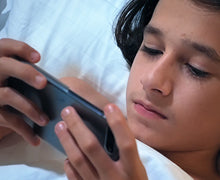
Previous studies suggested it was important for kids to cut off screen time two hours before bedtime in order to get good sleep, but new research shows it's not the timing of the screen use that is most important. Researchers at the University of Otago in New Zealand found using a device before bed did not disrupt sleep, but the adolescents who used a phone, tablet, computer or gaming device in bed took longer to fall asleep and slept less than those who put their phone away before getting into bed.
Lead study author Dr. Bradley Brosnan said the sleep guidelines needed to be reevaluated to better reflect modern life since screen time is such a mainstay in the bedtime routines of adolescents.
A total of 85 adolescents between the ages of 11 and 14 were tracked for their screen use over the course of a week. The study participants wore a body camera on their chest in the three hours preceding bedtime.
In addition to the body camera, which captured when, what and how they used their screens, a second camera was used in the bedrooms to capture screen time while in bed. The adolescents also wore a small actigraph to measure their sleep.
The study revealed nearly every person used their screens in the two hours before bed. More than half used their screen once in bed and one-third of them got back on their screens after trying to go to sleep.
"It quickly became obvious that adolescents spend a lot of their screen time while in bed," Brosnan said. "Our most interesting findings were that this screen time before they got into bed had little impact on sleep that night. However, screen time once in bed did impair their sleep—it stopped them from going to sleep for about half an hour, and reduced the amount of sleep they got that night."
The study showed it was particularly true for more interactive screen activities like gaming or multitasking, like watching a movie on one device and using a second device for another purpose.
"Every additional 10 minutes of this type of screen time reduced the amount of sleep they got that night by almost the same amount," Dr. Brosnan explained. "Our findings suggest that the impact of screen time on sleep is primarily through time displacement delaying sleep onset rather than any direct effects of blue light or interactive engagement as we didn't find associations with sleep latency and wakefulness during the sleep period."
Brosnan said in theory it would be best for devices to be kept out of the bedroom and used only before bed and not while in bed. But he acknowledged the sleep recommendations need to be revisited to make sense in the world in which adolescents are currently living so they are appropriate and achievable.



